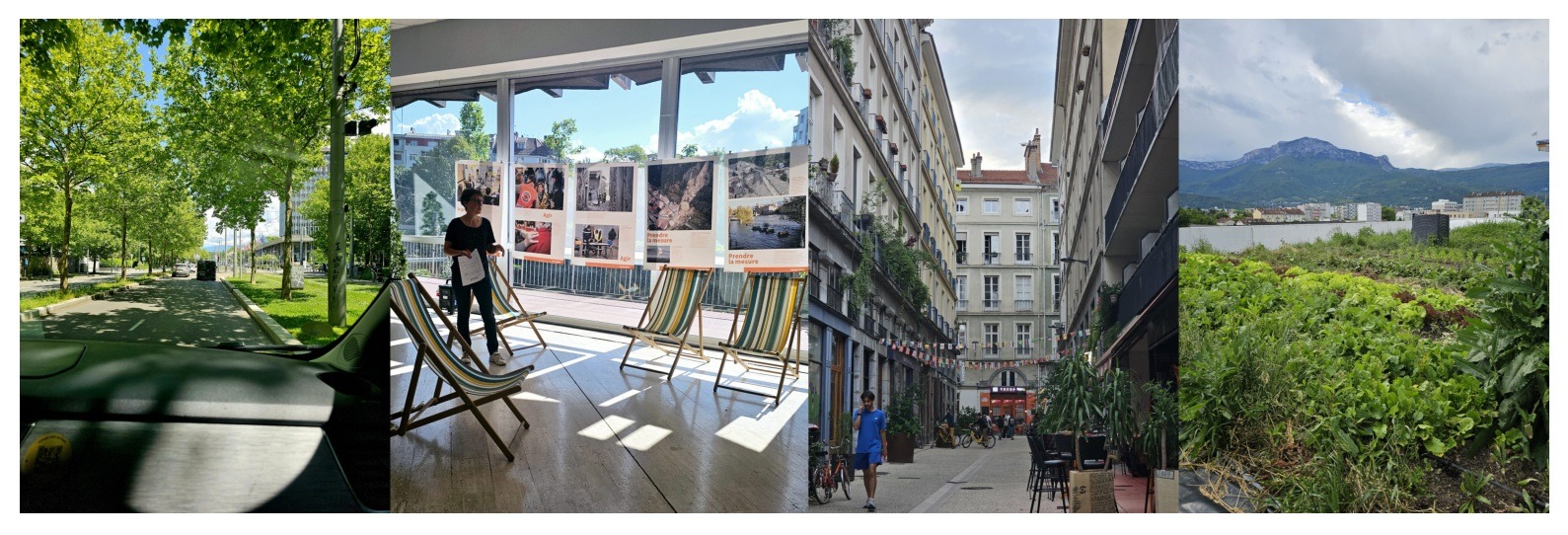The inspiring climate governance story of the Capital of the French Alps
The Interreg Europe project ClimateGO invited us, and we joined their team for a study visit in Grenoble, France this past week. The topic of the visit? – Governance and urban climate resilience of the city of Grenoble.
This experience was as refreshing as the Grenoble’s breezy air, which kind of makes you feel like you are at some coastal place. Even arriving late at night after a day of playing airport Tetris with the luggage felt nice, as the many trees surrounding us were moving their branches almost like they were waving us hello on our way to the hotel. Their soughing noise was interfered only by the sound of the bike pedals of people cycling near by.
As we learned during the following days, this is the default mood in Grenoble these days, and it is all thanks to the city’s climate adaptation strategies and policies in place. Thanks to the great programme prepared by our hosts Aletvia Solorio Real and Mathilde Bentayou-Geoffroy from the city of Grenoble, we received first-hand information about Grenoble’s experience on the path towards climate resilience. Municipal representatives from the different departments gave us an overview of their activities and shared with us their plans to make Grenoble a better place each day.
Starting with the presentation of the social and environmental analysis grid, the Doughnut of the city of Grenoble and an overview of Grenoble’s sustainability initiatives, we got familiarized with the many coordinated actions that the local government undertakes in the effort to improve the city’s climate resilience. The visual journey that started there – data presented in a simple, easy-to-understand and graphically pleasing way, followed us all throughout our study visit. The city also hosts an exposition called “Facing risks” where the findings from the risk vulnerability assessments of Grenoble are translated in diagrams, pictures and short guides on risk mitigation and crisis management.
Throughout the week, we heard about and saw some great municipal initiatives in place, including:
– Greening and increasing playground spaces in primary schools and simultaneously improving flood resilience;
-“Place aux enfants” or “The children’s place” project: Converting streets surrounding schools into car-free, walking and biking zones together with providing green communal spaces around the schools’ drop-off zones;
– Improving water management and providing citizens with more swimming options for the summer – local artificial lake and riverbank projects;
– The “Give back space for Isere river to better protect against flooding” project, a commitment to protect Grenoble’s urban area and its surroundings by a set of flood management and river management techniques: water level monitoring and warning systems, controlled flooding fields, draining structures and cascade weirs.
All these and many more initiatives are aligned with the City’s strategy for resilience and Grenoble 2040 project, which sets the basis for a greener, resilient, and inclusive Grenoble in 2040. It was said during one of the presentations: “We developed these measures and plans back in 2022 when Grenoble was proclaimed the European green capital of the year. The award European green capital was a nice recognition but also gave as a legacy to continue to improve the city for future generations and aim for sustainability to be in the centre of our urban planning. The successful completion of the Grenoble 2040 project means that the babies born when we made the plan will be able to receive the gift of a better city latest by their 18th birthday.”
In parallel with local government efforts, citizens and NGOs are making their own green imprints on the city map, as we found out during lunch at Le Bar Radis. Being a bar, a rooftop restaurant, the headquarters of an NGO, a café, greenhouse, urban garden, processing workshop and communal kitchen all at once, Le Bar Radis is a place where people come to discuss and do sustainability while picking vegetables off the rooftop garden in the middle of their city. And yes, they mainly come by bike. There and to most places in the city.
As bike initiatives and biking infrastructure peaked in the past few years, Aletvia says that now it is uncommon for people to cruise through the town by car. The mainstream cycling culture in the city of Grenoble is astounding.
The experience and great results achieved in Grenoble taught us that climate resilience of urban areas can only be achieved as a common goal to all involved parties through transparent, inclusive, participatory and governance backed up by science, set up and in an enabling environment for its citizens.
We are grateful to the ClimateGO project team for this study visit opportunity and we congratulate them on their efforts and accomplishments in Grenoble’s climate governance sucess stories!
